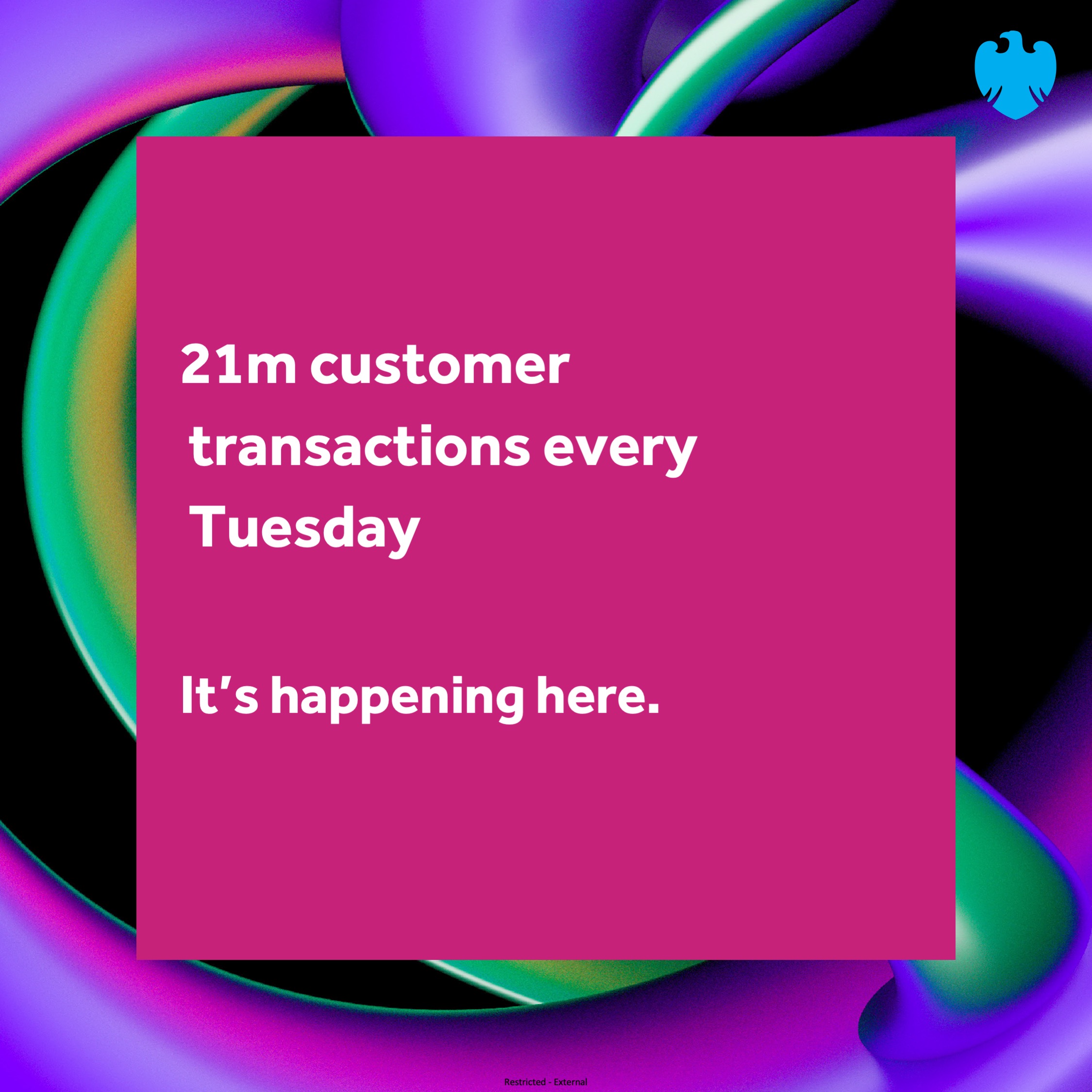
Today’s banking is all about technology. Trillions of transactions, billions of pounds, millions of customers, thousands of colleagues – from the global flow of capital to the smartphone swipe that pays for your morning coffee – there is no part of our business that does not rely on the latest technology.
That’s why tech people are the very core of Barclays. There are around 81,000 people working for Barclays worldwide, and over a third of them work in tech. They are at the heart of running our business today. They define our future tomorrow. Just ask Venkat, our CEO – he started his career as a developer.
The numbers involved are astronomical. Barclays UK customers are involved in 4.2 billion transactions, worth £151 Billion every year. They use their cards 187 million times at an ATM. And make 622 million card not present or ecommerce transactions, worth £57 Billion.
We support customers in everyday life. At peak times our systems are managing over 1200 transactions a SECOND. We handle £1.1 Billion in payments every day and manage 1.5 billion contactless transactions every year. Meanwhile almost 22 million Visa and Mastercard transactions, with a value of around £837M, pass through our networks daily.
Every part of those processes uses technology. Every transaction makes a change on a database somewhere, that needs to be reconciled with banking systems across the globe. Our customers expect everything to work first time, in real-time. Making that happen takes a lot of organisation, cutting-edge technology and the multi-talented people who make sure everything works perfectly 24/7/365.
The nerve centres of Barclays technology are the Command Centres, based across our three tech hubs in Pune, Radbroke, and Whippany. With a wall of screens constantly monitoring and updating the latest information on our systems, the Command Centres look like NASA mission control in a big budget movie.
When everything is working smoothly, the Command Centres are a constant hive of activity. When something goes wrong, they are the centre of incident management.
Part of Global Technology Service Management (GTSM), it’s the job of the Command Centres and Incident Management Governance to prepare for, manage and recover from the inevitable incidents that occur in interconnected and constantly moving world of digital finance.
At the Command Centres, we own all the ‘run the bank ‘ operations. We keep the systems live and fully operational for all our customers, clients and colleagues worldwide.
Richard Porter, Head of Command Centres
Incidents can start very simply and escalate very quickly. Take the process of reconciliation. At big banks like Barclays, we work hard to keep the flow of money and payments happening in real-time. But if you send money from one bank to another, or buy something that means your money moves from your bank to a seller’s account, that money doesn’t actually move right away.
If everything works well, then the figures on each account change pretty much instantaneously. You might even get a little ping and a notification on your phone to confirm the transaction. But, in the background, the banks don’t actually send that money to each other. Then, every four hours or so throughout the day, banks reconcile all those debits and credits between themselves in batch payments.
In any given batch, there will be some errors. Remember we’re talking about millions of transactions here, so some of them are bound to have issues; a customer has entered the wrong sort code, a shop’s payment systems are offline etc.
In the time between batch payments, our teams are working hard to catch those errors and resolve them. But on the very rare occasion that we can’t solve a problem in time for that batch to be paid on time, that holds the whole batch up until the next reconciliation. And that can have a knock-on effect across the whole banking system.
If money isn’t where it is supposed to be, the next set of payments can’t be made. If an organisation’s payroll doesn’t run as it’s meant to, then all its employees find that their pay is delayed. And all the direct debits they have set up to pay bills out of each month’s salary are suddenly pushing them into red. Which can mean penalties and further costs for them. Social media lights up. The newspapers start writing furious articles. The race is on to get everything back on track.
In fact, in the always-on smartphone era, social media is such a good barometer of system performance that we have a team that monitor social platforms for the early warning signs of any customer-side issues. They also play a vital part in keeping customers informed when maintenance is needed.
Tracey Farleigh is Director, Head of Service Management Governance. She leads the team that sets standards for how we deal with incidents and make changes to our systems. And, unfortunately, most of the time you can’t just turn it off and turn it back on again.
“At GTSM, we set and police the standards that our tech teams have to uphold when they are dealing with an incident.” says Tracey.
And that really matters, because making a change to our systems in the wrong way, or at the wrong time of day can have a massive impact.
Even if the action you take fixes a problem for thousands of people, taking a particular application offline for 15 minutes to make that change can impact millions more.
Tracey Farleigh, Director, Head of Service Management Governance
So Tracey’s team set the pace. Incidents are tagged for importance and severity. Different levels of incident are given to different teams with different targets on the time it takes them to get everything back running. The most important incidents get dealt with in the shortest timeframes. And, if a number of interacting systems and applications are affected by the same incident, then the guidelines give priority to solving the issues that have the biggest impact on our customers.
Meanwhile though, those different teams, across all three command centres, will be working closely together.
One of the most vital aspects of our work is the collaboration across teams and Command Centres. The handover between different teams around the world is a key part of the day. When my teams in Radbroke go home at night, they can trust their colleagues in Pune and Whippany to look after everything in exactly the same way.
Richard Porter, Head of Command Centres
The scale of the task, the level of vigilance needed and the importance of reacting fast are hard to overstate. If you think a payroll problem sounds serious, consider Universal Credit.
Barclays is proud to have the national responsibility for paying out Universal Credit to millions of people every Thursday night from midnight. The terms of the payment are that it will be paid into everyone’s nominated bank accounts by 9am on Friday morning. But usually it arrives some time before 12:01am. And that’s when people expect it.
People across the UK are waiting to receive the money and start making it work for them. How do we know? Because the Barclays banking app is busier just after midnight on Thursday than any practically any other time of the week. Minutes after the Universal Credit payment arrives, that money is moving, paying bills, supporting families and driving the economy. That’s just one of the ways our tech people make a huge difference to people across the UK.
Our tech people have real impact every single day. And they get to work with the latest technology on one of the best maintained, and most vital, mainframes anywhere in the world. There are so many elements to the work we do at the Command Centres that there are a huge range of tech roles to explore here – and all kinds of career paths.
Richard Porter, Head of Command Centres
The tech that moves the money, that underpins all our lives. It’s happening here.


